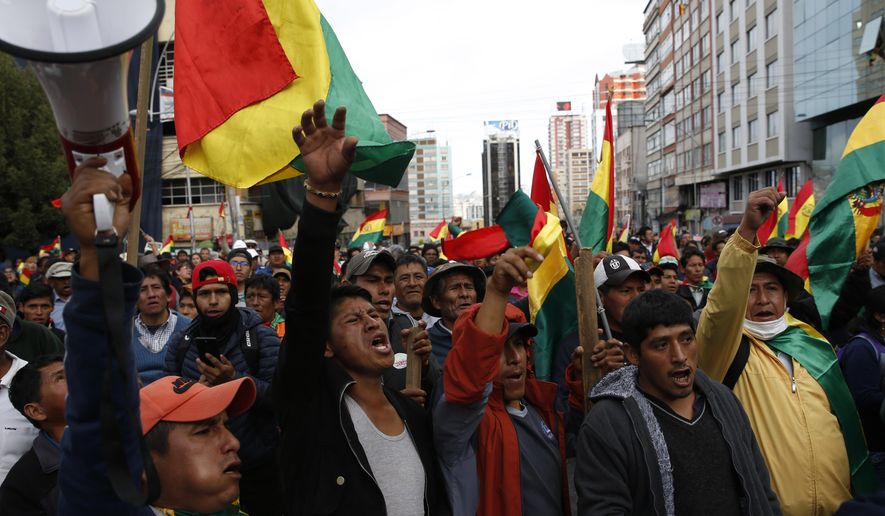LA PAZ, Bolivia (AP) - Bolivia’s government said Wednesday the Organization of American States is sending a 30-person team to launch a “binding” audit of a presidential election that the opposition says was manipulated to ensure the re-election of leftist President Evo Morales.
The Oct. 20 vote, which the government says was fair, gave Morales just enough support to win in the first round without the need for a runoff vote against a possibly united opposition behind former president Carlos Mesa. The result, and delays in the vote count, sparked street protests that have nearly shut down some cities.
Bolivian Foreign Minister Diego Pary said the OAS team will arrive Wednesday or Thursday, and that Spain, Mexico and Paraguay also have been invited to participate.
Mesa says the vote count was altered to give Morales just over the 10 percentage point lead needed to win outright. He said the opposition “does not accept the audit in the current terms, which were agreed on unilaterally.”
The audit would focus on the day of the election and the following days and will be “integrating and binding,” with all parties obliged to comply with results, Pary said. But the opposition wants the audit to also look into the electoral process before the Oct. 20 vote, when the Supreme Electoral Tribunal was accused of favoring Morales.
OAS Chief of Staff Gonzalo Koncke said the organization’s staff would begin to work Thursday and the results of the audit are expected in 10-12 days. He also said the work will focus on verifying several points, including calculations, certificates, ballots and the informatics process, as well as the statistical components and the safeguarding of ballot boxes. His comments on a video were shared by OAS President Luis Almagro on Twitter.
The official count showed Morales with 47.08% of the vote compared to Mesa’s 36.51%. The announcement of quick count results was halted for about 24 hours starting election night, raising alarms from the OAS, the European Union, the U.S. and other nations and fueling protests across Bolivia.
A strike continued Wednesday in Santa Cruz, an eastern city that is a bastion of the opposition. Backers and foes of Morales also continued to clash in the capital of La Paz, although with less violence than previous days, when dozens were injured and detained.
Many people said they were exhausted after two weeks of protests.
“All of these politicians can leave. They’re harming us,” said Fátima Medrano, who had to walk from her home to her office because some roads were blocked. “I have bills to pay and I have to work.”
Some Bolivians also complained that the costs of food and other products have shot up because the protests have blocked supplies.
Many residents of La Paz feel disappointed with Morales, despite economic stability during his nearly 14 years in office.
The llama shepherd from the Bolivian highlands rose to become a fiery union leader and eventually Bolivia’s first indigenous president.
But many Bolivians once excited by his fairytale rise were upset at his attempt to seek another re-election despite a popular referendum that upheld term limits. He was able to run only because of a Supreme Court ruling that the limits violated his political rights.
Last week, U.N. Secretary-General Antonio Guterres said the world body supported the OAS’ decision to perform an audit of Bolivia’s election results.




Please read our comment policy before commenting.